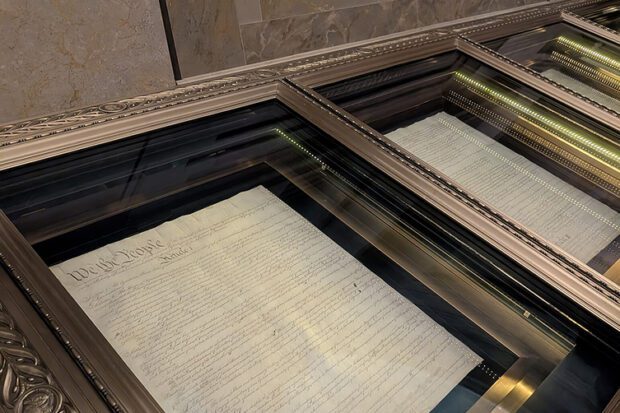

As an educator who has spent years studying the U.S. Constitution—not just the 603+ volumes of commentary written about the Constitution—but studied the Constitution of original intent itself, as well as how the framers and ratifiers said that document is to be interpreted, it has become well apparent that the federal government’s heartless immigration policy is not supported by the Constitution, and a call to return the power to regulate immigration to where the framers and ratifiers had originally intended for them to be is necessary.
The term immigration does not appear in the Constitution although the term naturalization (becoming a U.S. citizen) does. Almost from the beginning of the Republic, “naturalization” was accepted as a federal function.
Congress passed the Naturalization Act of 1790, requiring a two-year residency before applying for U.S. citizenship—with no restrictions on immigration: In the separate naturalization acts of 1795, 1798 and 1802, the residency requirement varied between five and 14 years—but with the one constant that there were no restrictions on immigration.
It was recognized by all that the power to control immigration was a power reserved to the states via Article X of the 10th Amendment: “The powers not delegated to the United States by the Constitution, nor prohibited by it to the States, are reserved to the States respectively, or to the people.”
Depending on how they are counted, there are 30–35 powers expressly granted to Congress in the Constitution. The “power…to establish an [sic] uniform Rule of Naturalization” is mentioned as are “uniform Laws on…Bankruptcies” (Article I, Section 8 [Clause 4]), but the power to regulate immigration is not.
The Supreme Court did not mention the federal power to regulate immigration until the Passenger Cases (1849). In that decision, the Court incorrectly declared that power to be one of federal jurisdiction that remained unimplemented by Congress.
The vague justification for that authorization relied on Article I, Section 8 [Clause 3], the Foreign Commerce Clause. This is one of those “catchall” clauses that allegedly allows Congress to regulate anything that it is not expressly permitted to do. Ironically, this “power to regulate commerce in human beings” is relevant to the heinous practice of chattel slavery.
The states have exercised this lawful prerogative from the beginning of the Republic, most notably by free state constitutional and statutory prohibitions on freedmen (former slaves) from migrating into their jurisdictions; some states (mostly in the Northeast) welcomed freedmen, and some states (mostly in the Midwest) did not.
One of the last attempts by a state to limit immigration occurred in the 1930s when California passed the “Anti-Okie Law,” forbidding the immigration of indigent people from other states.
Congress did not begin to usurp this state power over immigration until the Page Act of 1875, when it banned the entry of Chinese women, as they were all deemed “imported for the purposes of prostitution.” Seven years later, the first Chinese Exclusion Act banned Chinese men (laborers) as well.
Federal interference in this state’s prerogative progressively worsened until it has decayed into the insanity that we are experiencing today.
Our way out of this unruliness is the return of immigration to state control, as the framers and ratifiers had intended. If Texas wishes to restrict immigration it is certainly free to do so, as it does regardless of federal policy. More importantly, if California wishes to be open to those who want to better themselves, thus contributing to the dynamics of our free-market economy, Governor Newsom should protect them from unlawful federal interference.
If Newsom truly cared about the lot of free-market workers—calling them “undocumented” implies that they are doing something illegal—he would shut down the illegitimate activities of the Department of Homeland Security, by arresting all Immigration and Customs Enforcement agents and all Customs and Border Protection agents who are operating outside the Supreme Law of the Land by attempting to deprive human beings to their un/inalienable right to travel and peacefully sell their services in a free market.
The precedents for this action were established early on in the Republic:
- In the 1790s, Georgia threatened to arrest any federal agent who attempted to enforce the Supreme Court’s decision in Chisolm v. Georgia.
- During the War of 1812, the governor of Massachusetts refused federalization of his state’s militia for the purpose of conquering Canada, as the militiamen of New York refused to do the same thing.
- In the 1820s, South Carolina refused to allow the collection of Trump-like tariffs on imported goods.
- And in 1861, the governors of Kentucky, Tennessee and Virginia refused the federalization of their militias for the purpose of making war on the Confederate states.
In the modern era, Utah refused water needed to cool the supercomputers of the National Security Agency.
- Also, various states and municipalities have attempted to nullify unconstitutional federal statutes by declaring themselves to be sanctuary zones for guns and immigration.
- As a further example, several states have enacted “Defend the Guard” legislation prohibiting their National Guards from foreign deployments in the absence of a Congressional declaration of war.
The time has come for progressives to realize that the U.S. Constitution is on their side and to start pressing “progressive” Governor Newsom to start enforcing the law against these federal usurpers.

A really nice and informative article